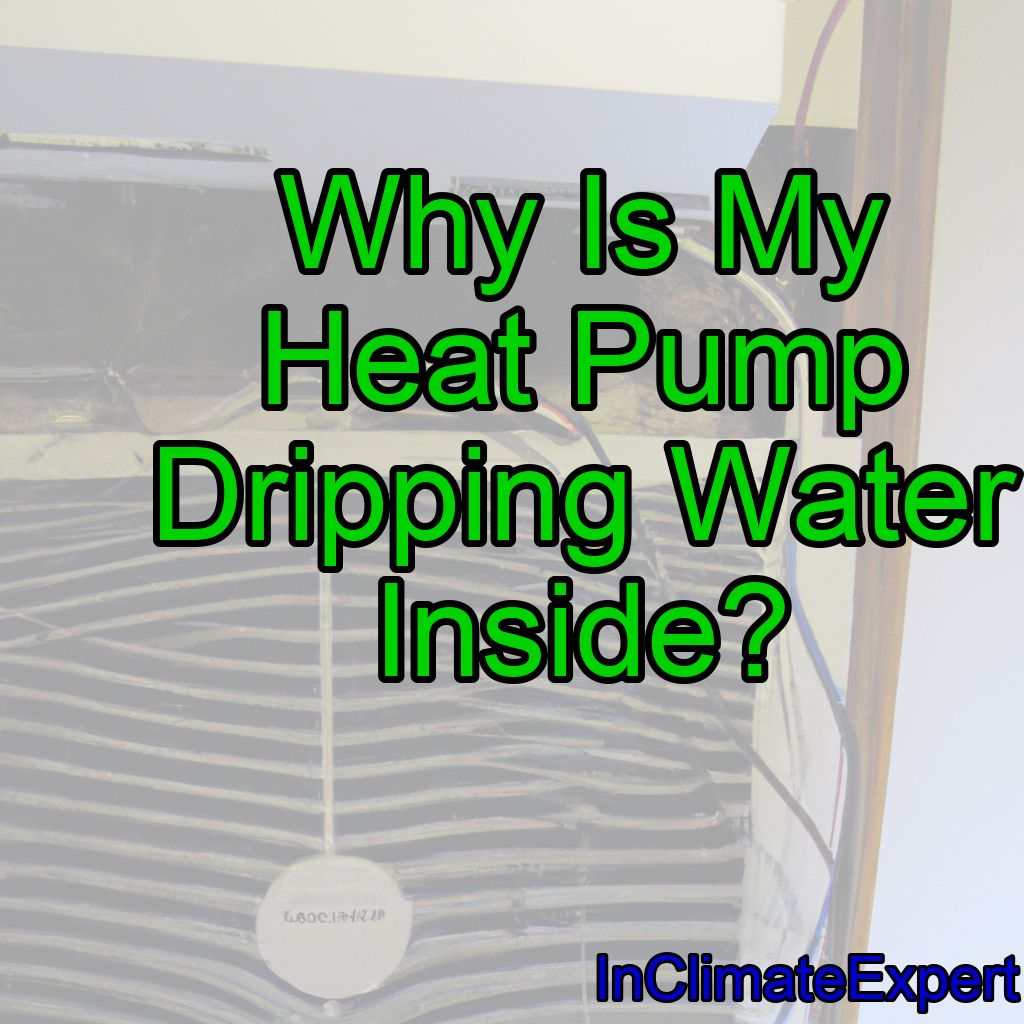If you have noticed water dripping from your heat pump inside your home, it can be a cause for concern.
Your heat pump may be dripping water inside due to several reasons:
1. Clogged or dirty air filter: A dirty air filter can restrict airflow, causing the evaporator coil to freeze and then melt, leading to water dripping inside.
2. Blocked or damaged condensate drain line: The condensate drain line is responsible for carrying away the moisture produced during the cooling process. If it’s blocked or damaged, water may back up and drip inside.
3. Frozen evaporator coil: Low refrigerant levels or poor airflow can cause the evaporator coil to freeze, which then melts and drips water inside.
4. Improper installation: If the heat pump is not installed correctly, it may not drain water properly, causing it to drip inside.
5. Cracked or damaged drain pan: The drain pan collects condensation from the evaporator coil. If it’s cracked or damaged, water may leak inside.
To resolve the issue, you should inspect and clean the air filter, check the condensate drain line for blockages, and ensure the heat pump is installed correctly. If the problem persists, consult a professional HVAC technician to diagnose and fix the issue.

Heat pumps are designed to transfer heat, but they should not be producing excess moisture that leads to water damage or mold growth.
Understanding why your heat pump is dripping water inside can help you identify the issue and take steps to resolve it.
There are several reasons why your heat pump may be dripping water inside, including issues with drainage, humidity levels, or a malfunctioning unit.
In this article, we will explore some of the common causes of indoor heat pump leaks and provide tips on how to troubleshoot and fix the problem. Whether you are experiencing minor drips or significant water damage, knowing what to do can help you protect your home and keep your HVAC system running smoothly.
Possible Causes Of Water Leakages
If you have noticed water dripping from your heat pump inside, there are a few potential causes that may be responsible for the issue.
One possible cause could be a clogged drain line, which can prevent the excess condensation from draining properly and cause it to back up into your home.
Another culprit could be a damaged or cracked condensate pan, which can allow water to leak out.
It is also possible that your heat pump’s refrigerant levels are low, causing the evaporator coil to freeze up and then thaw as it cycles on and off. This can lead to excess condensation and water leakage.
In any case, it is important to address the issue promptly in order to prevent any further damage or potential health hazards.
To prevent future water leakages from occurring in your heat pump system, regular preventative maintenance is key.
This includes scheduling annual inspections with a qualified HVAC technician to ensure that all components are functioning properly and addressing any issues as they arise.
Additionally, keeping the area around your heat pump clean and free of debris can help improve airflow and prevent clogs in the drain line.
Preventative Maintenance For Heat Pumps
Now that we’ve touched on why your heat pump may be dripping water inside, let’s talk about how you can prevent these issues from occurring in the first place.
Regular preventative maintenance is key to keeping your heat pump running smoothly and avoiding any costly repairs. This includes things like changing air filters, cleaning coils, and checking refrigerant levels.
By staying on top of these tasks, you can ensure that your heat pump is operating efficiently and minimize the risk of any unexpected leaks or malfunctions.
Moving forward, if you do experience a water leakage with your heat pump, there are some troubleshooting measures you can take to identify the source of the problem.
Troubleshooting Steps For Water Leakages
If you’re experiencing water leakages from your heat pump, there are a few troubleshooting steps that you can take to diagnose and potentially fix the problem.
Firstly, check the air filter in your unit to ensure it’s clean and not clogged.
A dirty or blocked filter can cause your heat pump to work harder than necessary, resulting in excess moisture buildup.
Next, inspect the condensate drain line for any clogs or obstructions.
If the drain line is blocked, water may overflow from the drip pan and into your home.
Additionally, make sure that the drip pan is properly installed and level to prevent water from overflowing.
By performing these simple troubleshooting steps, you may be able to resolve the issue without needing professional assistance.
If these troubleshooting steps don’t resolve the water leakage issue with your heat pump, it may be time to call a professional technician for assistance.
A qualified technician can identify and repair any underlying issues causing the leakages, such as a broken condensate pump or refrigerant leak.
Remember that continuing to operate a malfunctioning heat pump can lead to more serious problems down the line, so it’s always best to address any issues promptly with expert assistance.
When To Call A Professional
If you have noticed that your heat pump is dripping water inside, it could be due to several reasons.
Sometimes, the issue may seem minor and might not require a professional’s help.
However, in some cases, it’s best to call an expert.
If you notice that the amount of water dripping from your heat pump is excessive or if the unit is making strange noises, it’s time to call a professional.
Additionally, if your heating or cooling bills have increased significantly recently, there might be an underlying issue with your heat pump that only a professional can diagnose and fix.
Remember that attempting to repair the unit yourself can lead to further damage and may even be dangerous.
In situations like these, calling a professional is always the best option.
They will be able to identify the cause of the problem correctly and provide an appropriate solution.
Don’t hesitate to ask for help from a trained technician when necessary – it could save you money and prevent more significant issues down the line.
Conclusion
In conclusion, if you find your heat pump is dripping water inside, it’s important to take action quickly to prevent any damage to your property.
There are several possible causes of water leakages, including a clogged drain line, a malfunctioning evaporator coil or fan motor, and low refrigerant levels. By performing regular preventative maintenance on your heat pump, such as changing air filters and cleaning the outdoor unit, you can help prevent these issues from occurring.
If you do experience a water leakage issue with your heat pump, there are some troubleshooting steps you can take before calling in a professional. These include checking the drain pan for obstructions and ensuring that the drain line is clear and free of debris.
However, if you’re not comfortable performing these steps yourself or if the issue persists after troubleshooting, it’s best to call in an HVAC professional to diagnose and repair the problem.
Overall, proper maintenance and prompt attention to any issues can help keep your heat pump running smoothly and efficiently for years to come.
By addressing water leakages promptly and seeking professional help when needed, you can ensure that your home stays comfortable and safe throughout every season.




